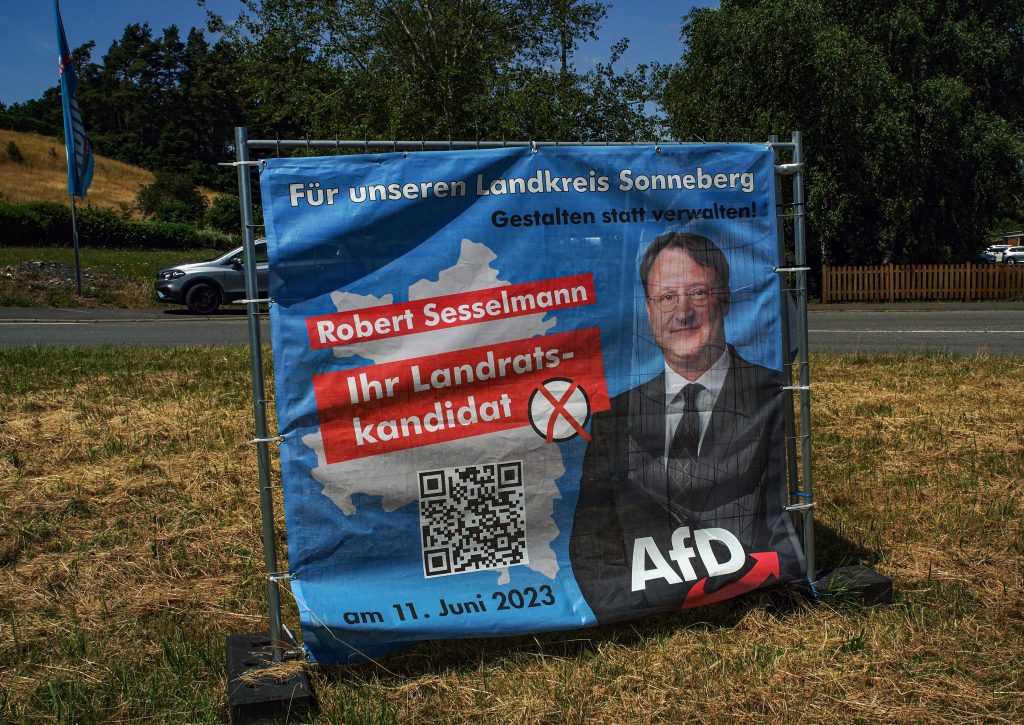Australia/Israel Review
Europa Europa: Is my Enemy’s Enemy my Friend?
Aug 4, 2023 | Alex Benjamin

What makes Katja Hoyer’s excellent recent book Beyond the Wall so useful for understanding Germany today is that it does neither of the things that have been the hallmarks of most books about the former German Democratic Republic (GDR)/East Germany. There’s no dewy-eyed nostalgia (sometimes called “ostalgie”) for that state, nor does the book simply reinforce what we all know about the GDR – repression, the Stasi police and a populace hemmed in by a brutal wall.
Instead, it talks about daily life and an ideology that was nanny-statism at its absolute worst, but which guaranteed a safety net for all citizens in terms of employment and housing. In the later chapters, Hoyer goes into depth about what happened after the wall fell and its lingering impacts today.
For anyone seeking to understand the apparently inexorable rise of Germany’s far-right Alternative für Deutschland party (AfD), this is a good place to start.
Pretty much overnight, the entire edifice of the GDR was wiped out when reunification occurred between 1989-1991. The rationale for the establishment of the GDR in the first place – as an insurance policy against any further self-destructive adventures in the all-conquering nationalism which had quite literally decimated the German people – was cast aside, along with an entire generational culture, way of thinking and way of life. The physical wall was gone, but it lived on in unified Germany via a large swathe of the country inhabited by a workforce whose skills were a very poor fit for national demand and whose educational qualifications had largely become worthless.
In the decades that followed, an entire generation, and their disaffected children, came to feel more and more aggrieved, providing fertile ground for populists. And the former East German states of Saxony and Thuringia, where issues of economic re-integration were most keenly felt, proved to be a rich hunting ground for the AfD.
Since its formation in 2012, the AfD has steadily grown in influence, and is attempting, somewhat in the mould of the French National Front, to make itself more “mainstream”. It just won its first local election – electing a district leader for Sonneberg district in Thuringia – in late June.
This seems a good place to recall a brief anecdote: Within the Brussels EU institutional bubble, my work as an advocate for Jewish issues and Israel is fairly well known. And so, some years ago, as I was sitting in one of the European Parliament cafés, an immaculately suited gentleman approached me and introduced himself as National Front leader Marine Le Pen’s Chief of Staff. He said Ms. Le Pen wanted to meet with me to discuss Israel and improving relations with Jewish communities. My first reaction, taken somewhat aback and unprepared, came from my gut: “Why?” His answer was disconcertingly simple: “Because my enemy’s enemy is my friend.” I didn’t meet Ms. Le Pen.
“My enemy’s enemy is my friend” – this sums up the attempts to cosy up to European Jewry, assailed as we are by increasing anti-Zionism, from far-right figures including Le Pen, the Netherlands’ Geert Wilders, Austria’s Freedom Party, and Italy’s Lega Nord. And to some Jews, it may present a compelling narrative.
Wilders, for example, proudly boasts that he spent time on an Israeli kibbutz in his youth. Meanwhile, the AfD has made standing up for Israel a foreign policy imperative.
The trouble is that domestically, their policies, whilst not antisemitic per-se, directly and very adversely affect Jewish communities. Legislation targeting circumcision, religious dress in public, and ritual slaughter are clearly directed against the self-declared “enemy” of these far-right populist parties – Islam and Islamic immigrants. Yet Europe’s Jews are caught in the crosshairs.
Whenever confronted with this problematic juxtaposition – support for the world’s only Jewish state abroad and attempting to legislate Jewish life out of existence at home – far-right populists offer a disconcertingly simple answer: “collateral damage”. No, thank you, that is not something I can live with.
Voices such as the AfD trumpet pro-Israel talking points on Palestinian incitement and don’t call terrorists “militants”, which can make some Jews forget the underlying nastiness here.
A couple of generations ago, it was the Jews that were a threat to Germany’s “national character” (whatever that means) – who were infiltrating the culture, stealing jobs, and whose dress and habits were a slap in the face to the traditional German way of life (again, whatever that means). Replace the word “Jews” here with “Muslims” and you have the essence of the policy platform of the AfD and most other far-right/populist parties in Europe.
With parties such as the AfD, “My enemy’s enemy” isn’t an invitation. It is a warning. If these parties are given the opportunity to marginalise or eradicate their “enemy”, who is next in their crosshairs? I hope we never find out.
Tags: Europe, Far Right, Germany, International Jewry






